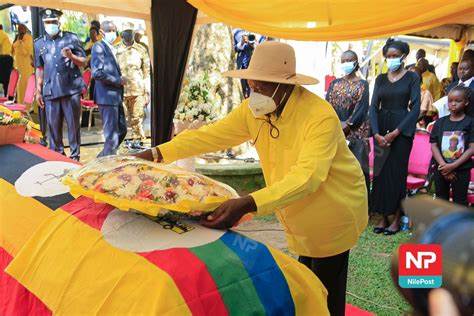President Yoweri Museveni’s recent attack on Kalungu County West MP John Joseph Ssewungu Gozanga during the funeral of former Moroto MP Simon Aleper is a grotesque display of his tyrannical disdain for accountability and genuine criticism. Dismissing Ssewungu as “a joker” and ridiculing his comments as “childish,” Museveni reveals yet again his deep-seated arrogance and contempt for anyone who dares to spotlight the monumental failures of his regime. This despicable act is not merely an insult to Ssewungu but an affront to every Ugandan suffering under the weight of Museveni’s gross incompetence and negligence.
Ssewungu’s observations about the Iganga-Tirinyi highway, which he correctly identified as a contributing factor to Aleper’s tragic accident, were a sobering indictment of Uganda’s disastrous infrastructure. Rather than addressing the critical issues raised by Ssewungu, Museveni chose to deride him, questioning his intelligence and labeling his concerns as mere childish prattle. This dismissive attitude is typical of a despotic ruler who, rather than confront the dire realities of his misrule, chooses to belittle and mock those who point them out.
Museveni’s scorn for Ssewungu’s call for dual carriageways is emblematic of his complete detachment from reality. Uganda’s road network, plagued by dangerous, poorly maintained routes, has become a death trap for countless citizens. Yet, Museveni, ensconced in his bubble of luxury and self-indulgence, ridicules proposals aimed at mitigating these hazards as if advocating for basic road safety were an absurd extravagance. This is a leader who, while his citizens perish in preventable accidents, squanders resources on his opulent security apparatus and personal extravagance.
Museveni’s feeble excuse that the government is struggling to tarmac roads in Eastern Uganda—such as Moroto-Kotido, Kotido-Kaabong, and Kaabong-Kidepo—is a pathetic attempt to obfuscate the core issue. These projects, which have languished in bureaucratic purgatory and corruption, epitomize the mismanagement and siphoning of public funds that are the hallmarks of Museveni’s kleptocratic regime. By mocking the necessity for dual carriageways, Museveni effectively condemns Ugandans to ongoing suffering and death on the country’s roads. His callous disregard for human life reveals a moral bankruptcy so profound it borders on criminal negligence.
Moreover, Museveni’s insinuation that Aleper’s accident resulted from the victim dozing off at the wheel, based on his so-called “intelligence,” is as insensitive as it is disingenuous. This baseless assertion is a crude attempt to divert blame from the hazardous conditions of the highway and onto the victim. It’s a familiar tactic of Museveni’s—a tyrant adept at shifting blame and evading responsibility. Instead of confronting the appalling state of Uganda’s roads, he spins a narrative that absolves his administration of any culpability.
Museveni’s derisive remarks about Ssewungu and other critics as “not so useful” and akin to children talking nonsense further expose his authoritarian nature. This is a dictator who has surrounded himself with sycophants and enforcers, stifling any dissent with brute force and intimidation. Ssewungu’s courageous stance in the face of such oppression is commendable, and his willingness to speak truth to power should inspire all Ugandans to demand change.
The president’s derision of Ssewungu’s intelligence is particularly galling coming from a man whose own intellectual and moral deficiencies are glaringly evident in every facet of his governance. This is a ruler who has overseen rampant corruption, economic stagnation, and a gross erosion of democratic principles. Museveni’s attacks on Ssewungu are a transparent ploy to deflect attention from the systemic failures that define his disastrous regime.
Ugandans must reject Museveni’s empty rhetoric and demand accountability for the crumbling state of the nation’s infrastructure. The call for dual carriageways is not a frivolous whim but an essential measure to ensure road safety and save lives. Museveni’s mockery of such proposals underscores his utter unfitness to lead.
In the broader context of Museveni’s despotic rule, his tirade against Ssewungu is merely a glimpse into the extensive pattern of abuse and mismanagement that has plagued Uganda. It starkly illustrates the urgent need for new leadership—one that prioritizes the welfare of its citizens over petty political squabbles and personal vendettas.
As Ugandans mourn the loss of Simon Aleper, they must also confront the broader implications of Museveni’s continued reign. His dismissive attitude towards genuine concerns and penchant for scapegoating are symptomatic of a regime that has long overstayed its welcome. The time has come for Ugandans to rise up and reclaim their nation from the clutches of a tyrant who has repeatedly demonstrated his inability to guide the country towards progress and prosperity.
Museveni’s outrageous hypocrisy must be exposed, and his regime held accountable for its failures. Only then can Uganda hope to forge a path toward a brighter, safer, and more just future.







Discussion about this post